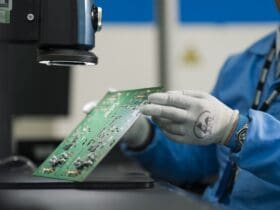The UK Automotive industry is unlikely to return to previous high levels of production and component suppliers in Wales must look elsewhere to survive, delegates to the Autolink 2022 conference were told this week.
The gloomy outlook and warning was given by Prof Ian Henry, managing director of AutoAnalysis and a HM Government advisor on the motor industry speaking at the annual Welsh Automotive Forum event in Cardiff Stadium.
Over 200 member delegates, supplier and service representatives attended the only Welsh networking event for the automotive sector.
Prof Henry said that a combination of Brexit changes, Covid and chip shortages had started the production decline and this year Russia’s invasion of Ukraine had brought new problems, initially affecting parts supplies and then a steep rise in energy prices.
He pointed out that initially the UK motor manufacturing sector had performed better than many in Europe but long term worries exist over investment and there is a growing feeling that some components should be made in Britain and not imported.
“In the first half of 2022, car production is down 19% below that for 2021, mainly as a result of Honda closing its Swindon factory,” he said.
“It is expected that by the end of this year car production will reach 825,000, compared to 850,000 a year ago, but that’s 35% down on 2019 and a whopping 50% on the high figure of 2017.”
Prof Henry added that all the indications he saw suggested the growth in electrified models would not be as great as first thought and a considerable tail of petrol and diesel models would be seen in the market after 2040 but in lower numbers.
There would also not be the electric models on the market to justify the number of gigawatt battery plants which would supply traction batteries and these developments were likely only if carmakers agreed on some joint ventures to buy the batteries.
“Welsh suppliers need to look elsewhere for growth as it’s unlikely to come from increased production by existing vehicle manufacturers and strategies to protect what they have are needed.”
He said support for the automotive sector in Wales could be led by Welsh Government and public bodies, councils and emergency services buying only models which used components made in Wales and set an example to others.
Financial Times global motor industry correspondent Peter Campbell also told the audience that sector megatrends, OEM strategies and global supply chains are all changing.
There is great diversity in approaches to the future of road transport, with some manufacturers early adopters of EVs while others were hedging their investments and ownership is being replaced by leasing agreements and car clubs.
Onshoring of components is one aspect to smooth out supplies but the varying costs of energy and pool of skilled labour to make what is needed are also factors coming into decision making.
Deliveries of cars are now stretching out over a year in some cases, he added, and manufacturers are streamlining their ranges to conserve electronic components for the models which earn them the highest profits.
In future car-makers are more likely to build what they need themselves rather than rely on external suppliers for parts, particularly as EVs use far fewer components and this will also be a challenge to existing businesses in the sector.
Wales Minister for Economy, Vaughan Gething, revealed that former GM purchasing and supplies executive Lawrence Davies MBE is the new Chairman of WAF.
His father came from Wrexham and Mr Davies has worked for 30 years in the automotive industry, advising HM Government for a number of years through the Automotive Investment Organisation and DTI.
Mr Davies told the meeting he would continue the work of his predecessors to promote the Welsh automotive sector at all levels of business and politics, particularly in the transfer to EVs and development of greener transport.







Leave a Reply
View Comments